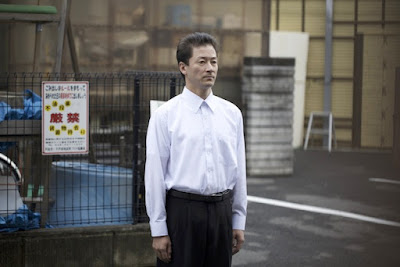"Harmonium" isn't the first film about an intruder on
domestic bliss - it isn't even the first Japanese film; it isn't really even
Fukada's first - so what has made Koji Fukada's fifth feature win praise as
being widely regarded as the best of Japanese cinema in 2016?
Like many films before it, "domestic bliss" is not strictly
true. Suburban living is not quite all it's cracked up to be for Toshio (Kanji
Furutachi), his wife Akie (Mariko Tsutsui) and daughter Hotaru (played by two separate
female human actors). The repeating side-view of their kitchen dining table
paints a picture of their family life: Toshio reading the paper, in a detached
manner, while the overly cautious Akie mothers Hotaru.
Here is a family that seem bored of each other and their roles as part
of a standard family. Until - initially against Akie's middle-class sensibilities
- Toshio allows his old friend Yasaka (man with teeth, Tadanobu Asano),
recently released from prison for murder, to work for him in his workshop and
move into their home. It was then that everything changed.
Takashi Miike's "Visitor Q" has an equally bemusing starting
point. Not the dad trying to pay his daughter for sex while he films it bit,
but the inviting a random man whom attacked him in the street to come and live
with his family part. There is something unnerving about the way Toshio allows
Yasaka to simply walk back into his life, seemingly under the spell of the
ex-con, giving him what he needs. Obviously, there is more to it than simply
helping out an old friend.
Naturally, Akie is apprehensive and nervous of this stranger being in
the house around her young daughter. But Yasaka seems charming enough,
efficient in his work and eating habits, helping Hotaru with her learning to
play the harmonium. For the film's first half, Yasaka dresses in the purest
white, unbefitting a man with his past, though he acts as a guardian angel over
the family, bringing them to life: Toshio more relaxed and enthused; Hotaru
over-excited about her upcoming harmonium performance; and Akie overly excited
in the trouser area by his presence (hmmm, Tadanobu Asano). As in "Visitor
Q" and many others before it, the stranger introduces a new life to the
family.
But unlike "Visitor Q" (and I'm sure others), this positive
impact on the family is not the story here. This is not solely a satire of the
soap opera family unit, but has as much in common with the calculated revenge
of Park Chan-wook's "Oldboy" (and I'm sure others, beyond my limited
echo chamber of nothing but 1990s onwards Asian cinema). Fukada is very blatant
in his depicting of Yasaka removing his pure white (not once did he get them
dirty) work overalls to reveal a deep red T-shirt underneath as he introduces
his true intentions.
Eight years on, we see the long-lasting impact that Yasaka's
"visit" had on the family. Beyond Hotaru's obvious physical change,
Toshio reveals himself as relieved by the whole event, clearly nodding to his
past with Yasaka and why he was so willing to take him in in the first place.
For him, years of uncertainty have seemingly been answered. Akie is much more
emotionally impacted, her overly-cautious nature furthered, repeatedly cleaning
her hands and not wanting anyone near her daughter. The couple have become more
communicative than before as a result of the events, but the difference in
their coping strategies highlights clear differences between the pair.
The Japanese title "Fuchi ni tatsu" ("Standing on the
Edge") is perhaps more fitting for the film's conclusion with Yasaka's
revenge on Toshio complete, leaving the latter scrambling to try and stop the
inevitable. A film of two halves, this starts gently and leaves you wondering
where it is going, much as Toshio does Yasaka. The sudden act brings the film
out of its slumber as the story is revealed and the pace picks up, resulting in
an end that cleverly sees things come full circle; harmony now restored.
Fukada handles the film well throughout, keeping the atmosphere dark,
forever hinting at what lies beneath. But it is by no means perfect, with the
character's reactions at times understandable, at others bemusing. Not a lot is
packed into the two-hour running time, and a lot of what is brings to mind many
other films. Apart from those previously mentioned, Shohei Imamura's "The
Eel", a 1990s Hirokazu Kore-eda and anything by Kiyoshi Kurosawa come to
mind in terms of both style and themes of isolation within the family. Whether
this is a bad thing or not depends on your personal preference.
Sadly having spent much of the last decade in poor Hollywood films (his
lauded performance in Scorsese's "Silence" aside), this is a welcome
return for Asano to the indie scene, where he always delivers, as the externally
calm but deeply raging Yasaka. Everybody's new favourite, Kanji Furutachi - used largely in bit-part roles - is
interesting in his more leading role as Toshio, seemingly indifferent, becoming
more relieved, before finally angry and scared, developing the character with
the film. Mariko Tsutsui, however, is perhaps the strongest here as doting
housewife falling into grief and madness.
This is dark and brooding throughout, switching from mundanity, to lust, to violence, to anger, to grief, to searching, resulting in pain and suffering. But one constant remains clear throughout. While trying to lead a normal life, Toshio's past continually haunts him, however much he tries to conceal it; the angelic demon Yasaka constantly watching over him, ensuring that Toshio's true sense of relief is only earned when Yasaka can at last smile.



No comments:
Post a Comment